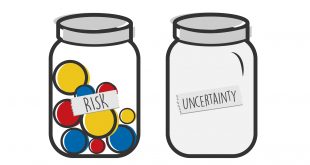In September 2021, a Dutch judge decided, in a case of the FNV Union against Uber, that Uber drivers are employees, not dependent or independent contractors. Meaning, on the micro level, that these employees in one stroke were entitled to more money, more protection and more rights. In the macro-conceptual framework of the International Labour Organization (ILO) this means that they shifted from a somewhat informal status to a formal status (see below). While it shows up, in the...
Read More »The fatal flaw of mathematics
from Lars Syll Gödel’s incompleteness theorems raise important questions about the foundations of mathematics. The most important concerns the question of how to select the specific systems of axioms that mathematics are supposed to be founded on. Gödel’s theorems irrevocably show that no matter what system is chosen, there will always have to be other axioms to prove previously unproved truths. This, of course, ought to be of paramount interest for those mainstream economists who still...
Read More »Causality as child’s play
from Asad Zaman 1 THE DILEMMA OF CAUSALITY Study of causality confronts us with a huge dilemma. Intense controversy has raged for centuries over this topic among the philosophers. At the same time, studies of child development show that infants learn about causal concepts almost from birth, and toddlers have a sophisticated approach to causality. How can causality be easily understood by babies, but remain confusing and complicated to the best philosophers for centuries? The...
Read More »The proliferation and efflorescence of indicators
from Ken Zimmerman (originally a comment) In the early 20th century the emergence of the United States as a global force unparalleled and nearly unrivaled in material might catapulted obscure economic indicators into central, abiding elements of national life. No “man on the street” would have given a thought to gross national product or national income in the 1920s or at any point before then, and not simply because that number didn’t exist. People wouldn’t have thought of their nation...
Read More »Is there a “policy”?
from Peter Radford I read this morning that the Federal Reserve had bought, at the peak of the recent crisis, about 40% of all US government bonds being issued. This may, to some of you, be something of no concern. Think again The illusion that there are separate spaces for monetary and fiscal policy is belied by this fact. Which one was it? Was it the Fed flooding the economy with money? Or was it the government issuing debt to finance economic support? I suppose it was both. But it...
Read More »What killed macroeconomics?
from Lars Syll The COVID-19 pandemic impelled governments to fall back on “fiscal Keynesianism,” because there was no way that just increasing the quantity of money could lead to the reopening of businesses that were prevented by law from doing so. Fiscal Keynesianism in the big lockdown meant issuing Treasury payments to people prevented from working. But now that the economy has reopened, the practical rationale for monetary and fiscal expansion has disappeared. Mainstream financial...
Read More »Consumer prices 1209-2020
from Jonathan Nitzan and Shimshon Bichler This long-term consumer price series shows that, after 1900, inflation changed in two important ways: 1. Magnitude: Until 1900, UK’s annual inflation rate averaged 0.4%. From 1900 onward, it averaged 4.0%. 2. Direction: Until 1900, consumer prices went up and down. From 1900 — with the exception of the great depression — they went only up. *** The reason for this change has had a lot to do with the new capitalist mode of power — specifically: 1....
Read More »For nearly the last 45 years the US has taken the wrong road
from Ken Zimmerman (originally a comment) I shall be telling this with a sigh Somewhere ages and ages hence: Two roads diverged in a wood, and I— I took the one less traveled by, And that has made all the difference. Robert Frost. Frost’s poem is usually interpreted with a positive spin. I give it just the opposite interpretation here. Commenting today on the world around us is difficult because for nearly the last 45 years the US has taken the wrong road. On the economic side the US has...
Read More »The sabotage of efficiency
from Peter Radford Sabotage. Not the sort of sabotage we associate with plucky heroes undertaking dramatic action like blowing up railway lines and so on. No, the sort of sabotage that is a great deal more subtle. The kind that is summed up by the metaphorical boiled frog. The slow devious and underhanded chipping away at something termite-like until the edifice is more fiction than fact. That sort of sabotage. The sort of sabotage that Thorstein Veblen wrote about a hundred years ago...
Read More »The real issue is what we mean by growth
from Gerald Holtham (originally a comment) People have come to expect and hope that life will be better for their children than it was for them. That can be true of some people in upwardly mobile families in societies with social mobility. If material welfare is stable in such a society, however, upward mobility must be matched by downward mobility. Therein lies a difficulty; the rich and powerful will not readily accept such an outcome for their offspring. Economic growth is the solvent...
Read More » Real-World Economics Review
Real-World Economics Review



